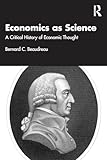Economics as science: a critical history of economic thought
Material type: TextPublication details: Routledge London 2025Description: viii, 280 pISBN:
TextPublication details: Routledge London 2025Description: viii, 280 pISBN: - 9781032863306
- 330.09 BEA
| Item type | Current library | Collection | Call number | Copy number | Status | Date due | Barcode | |
|---|---|---|---|---|---|---|---|---|
 Book
Book
|
Indian Institute of Management LRC General Stacks | Public Policy & General Management | 330.09 BEA (Browse shelf(Opens below)) | 1 | Available | 008826 |
Browsing Indian Institute of Management LRC shelves, Shelving location: General Stacks, Collection: Public Policy & General Management Close shelf browser (Hides shelf browser)

|

|

|

|

|

|

|
||
| 330.0724 JAC Experimental economics: method and applications | 330.0724 KAG The handbook of experimental economics | 330.0724 SAK Games, decisions, and markets | 330.09 BEA Economics as science: a critical history of economic thought | 330.09 HUN History of economic thought: a critical perspective | 330.09 MIC History of economic ideas: from Adam Smith to Paul Krugman | 330.09 SAN Short history of economic thought |
Table of Contents:
1. Introduction 2. Core Principles 3. Growth Theory 4. Income Distribution 5. Macroeconomics 6. Price Theory 7. International Trade Theory 8. Modern Economic Thought: Ideology or Science? 9. Nobels: Ideology or Science? 10. Directions for Future Research 11. History of Economic Thought: Anecdotes and Fun Facts 12. Genealogy of Economic Thought 13. Summary and Conclusions
This book provides a critical approach to the study of economic thought – from neoclassical economics, to Marxian economics, and to Keynesian economics – through the lens of science and the scientific method.
It examines the collection of ideas that constitute the core of economic thought in the five basic fields of economics: growth theory, income distribution, macroeconomics, price theory and international trade. In each of these, the analysis is chronological, detailing the various events and developments that led scholars to inquire into the underlying mechanics of the phenomena in question. This is followed by a critical examination of the various scholarly contributions, including those of Nobel Prize laureates, in terms of their scientific merit. Each of the five core chapters begins with a listing of chapter objectives and ends with a summary, as well as discussion questions to encourage debate. Short excerpts from the key works are provided to allow the reader first-hand exposure to primary sources.
Reinforcing the idea that economics is a scientific endeavor, Economics as Science: A Critical History of Economic Thought sets out to demonstrate the relevance of the tools and techniques students of economics acquire during their studies in understanding economic phenomena throughout the ages. It will be an invaluable resource for students of the history of economic thought and economics more generally.
(https://www.routledge.com/Economics-as-Science-A-Critical-History-of-Economic-Thought/Beaudreau/p/book/9781032863306)
There are no comments on this title.

